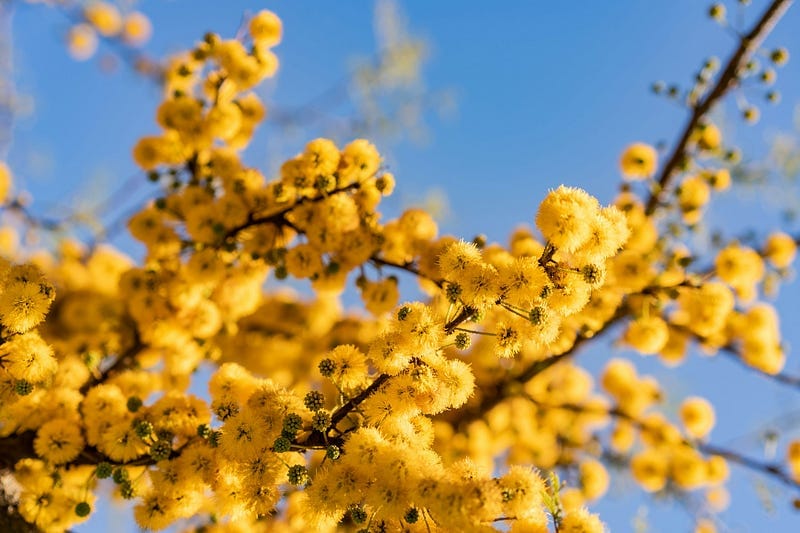Bittersweet

Spring holds a special place in my heart.
It’s a time when the garden in our south Kyoto home bursts into vibrant yellow hues of blooming mimosa. Under the bright sunlight, I feel these shrubs emanate a soothing aura that heals a broken soul.
It’s unthinkable that the same row of mimosas outside our garden, the warm feeling of the sun, and this same blue sky could slit my heart open and bring me so much pain when I think about one particular spring. I was nine years old, and Natsuo — my brother was six.
Natsuo was a tiny wisp of a boy. His thin frame was fragile, his cheeks hollow, and his skin pale. His delicate lungs were always susceptible to the harshness of winter as they were severely ill.
In that time, as the cold months passed, his condition worsened and lingered until spring. My mother told me that Natsuo always had weak lungs as a child; we didn’t think much of it as it always came and went. But not this time.
One morning when I helped my mom tidy up our tatami room, where we mainly slept these days to keep our eyes on Natsuo. I heard him asking my mom while she was wiping his tiny face, which was burning red with fever.
I remember his constant cries for cool syrup water to soothe his feverish body. At the same time, my mother insisted on warm water for his weak lungs.
“Natsuo, you are not to have cold water; it’s not good for your lungs,” my mother would insist.
“But I want cool water with syrup, mama, pleaseee!” Natsuo pleaded. It broke my heart to hear his persisting voice cracking with desperation.
His moistened eyes filled with tears as he turned toward me, “Masako, please, it will make me very happy. I will feel better. Please get me some, I won’t tell Mama. Please!”
I had seen this face before, last autumn, when we walked home from taro picking in the next village. He wanted me to lift him and put him into the sling on my back so he didn’t have to walk home. He knew that his big sister would do anything for him.
Before he could say further, I bent down and cuddled him. I whispered in his ear, “One day, when we grow up, I will buy you a very special *amezaiku. How about a cute little rabbit? You like that?”
He shook his little head and said, “I want a falcon. A big one with very very strong wings so I can fly far away from this body. It’s getting so uncomfortable in here now.” His eyes began to close.
“OK. But first, tomorrow when the sun is shining I will bring **mizuame and will put some in the water for you. Today is dark and very cold, you won’t enjoy it as much.” I patted him on his head as I spoke.
“You promise?” he spoke with his eyes still closed. “You promise me, Masako.”
“Yes, my little angel. I promise you.” I put my cheek against his heated forehead and whispered,
“I’ll see you in the morning.”
“See you in the morning, Masako.” And the darkness fell.
The next day, in the light of a chilly dawn, a howl pierced the silence. It filled the entire house with terror.
I jolted from my sleep and darted over to Natsuo’s futon, where my grandma knelt, face down, still screaming while clutching onto Natsuo’s legs, My mom, shaking with uncontrollable sobs, rocking his body desperately, trying to jolt the life back into the stiff figure.
Before my grandma could get to me, I reached for his leg and grabbed it. In a cold spreading horror of my realization, his leg, which was once warm with life, was now rock-hard and cold. And I knew he had left.
The world went dark and silent at that moment. Someone had pushed a mute button, then took the sun away. Natsuo was the only sunshine in my cloudy, dusty world.
And the agonized cries from that morning never faded from our house.
Grandma told me that when my father passed away, my mom didn’t mourn as much because he died in military action, and that was a thing about military action: there would be no return except an urn with ashes inside.
Natsuo’s death was different. He was our little angel, our sunshine, the man of our house, our hope, our candle in the darkness of the night.
He was our everything.
We didn’t see the coming grief the same way we would when waving goodbye to someone who’s going to the war. I guess my mother didn’t know how to process the pain in herself and, therefore, didn’t know what to do with mine.
His passing carved a big void in our lives, a wound that refused to heal.
In the aftermath of Natsuo’s death, our family drifted apart, drowning in our own grief, a sea of unspoken words, and unanswered questions.
In the summer of that same year, Japan announced its surrender in World War II. It brought the war to a close, our lives in the countryside had been nothing but years of turmoil. My mom and I grew apart more and more, especially after Grandma passed away; there was almost nothing else left to say between us. No closure.
We left the silence on for too long.
I secretly blamed her for forbidding Natsuo of that cool syrup that day. I wondered if she knew it would be his last wish, would she hesitate to give it to him?
I also blamed myself for not knowing better that just one cup of syrup water wouldn’t kill him; after all, he wasn’t asking for poison. I blamed myself for not giving him the last drop of joy he wished for in his final moment.
I believe he died of a heartbreak that could have been prevented. If he were to die because of drinking that cool syrup water when he was ill, at least he would die the happiest boy.
But who would know, and who could turn back time? This is why regret is an ever-unhealed wound. It will never heal because there is nothing we can do to turn the clock back and undo the mistake.
There’s only one passing moment. The second of that exact minute, of that exact hour and day, of that exact year — and it’s forever gone.
There was nothing I could do about my brother’s sickness or the unjust truth that he died so young. Or that I didn’t make him a happy boy in our last moment together, the moment I would never have again in this life.
But as years passed, I learned the futility of clinging to regrets. There would be no closure, no peace, if I chose to cling to the past that I couldn’t go back to change anything.
Every sweetness I taste would come with a tinge of sadness and pain. Every sunshine would be tinted grey — if I didn’t let the past go and move on.
I taught myself that my sweet memories of him would stay, and nobody could take them away from me. I could still ‘choose’ to be grateful that I was once a sister, and my brother was a precious gift that lit up my childhood.
I had given my best to be his sister, we enjoyed our brief time together, and I cherished each passing moment I had with him until the end.
I was given that chance; the joy was real, too, not just the pain.
And for that,
I forgive myself.
I forgive my mother.
I forgive the harsh winter that took my brother’s life.
And I forgive life that was so cruel to all of us then.
“You can cut all the flowers but you cannot keep Spring from coming.” — Pablo Neruda.
Although the pain may never fully fade, I can take comfort in knowing that his love will always be by my side, guiding me through the darkest of nights and into the light of a new day.
Each day, as spring unfolds its tapestry of colors, I find solace in the simple pleasures of nature — the chirping of birds, the gentle breeze that rustles the trees, and the delicate petals dancing in the wind. These moments, though fleeting, are a reminder of the beauty that surrounds us, even in the midst of pain.
And as the warm spring sun bathes the world in its golden glow, I am reminded that life, despite its sorrows, is still worth savoring, one sweet moment at a time.
![By 海獺 (Own work) [CC BY-SA 4.0 (https://creativecommons.org/licenses/by-sa/4.0)], via Wikimedia Commons](https://www.theindividualstar.com/content/images/2025/04/1-yvhrss-uogqbrb80ksvlka-jpeg.jpg)
*Amezaiku is a traditional Japanese sweet made of a dollop of hot and soft candy pulled out of the pot and crafted into animal shapes. They used to be widely available in the old days but are very special and rare now.
**Mizuame , or “water candy,” is a kind of Japanese sweetener. It comes in a clear, thick, sticky liquid made of starch, is converted to sugar, and is used in similar ways to honey.
